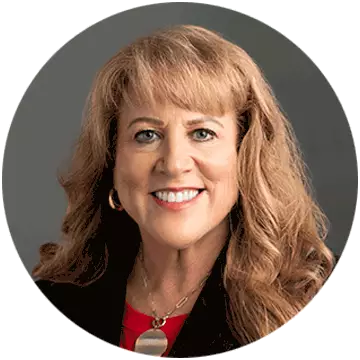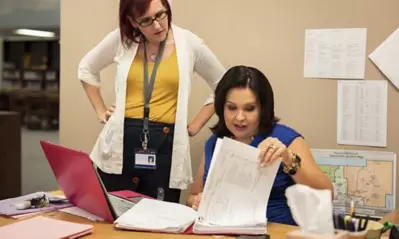Teacher interview questions and answers

Written by Michael Feder

Reviewed by Pamela M. Roggeman, EdD, Dean, College of Education

Educational institutions consider a wide variety of factors — including your credentials and your education degree — when deciding which candidate to hire. To stand out, you must deliver a strong interview. Here are some tips and common teacher interview questions you may encounter.
Teacher interview tips
Anticipating and answering difficult teacher interview questions is only part of the interview prep process. Preparing for any interview also includes presenting a good image, identifying what to bring and following up with your interviewer. Thoroughly preparing for an interview can potentially make a difference in your confidence and your chances of making a good first impression.
Part of delivering a strong interview involves emphasizing your strengths and being prepared with the right materials. The following tips can help you get everything in order and improve your chances for a productive meeting and interview process.
Prepare for the interview
Before you sit down for your virtual or in-person interview, take time to research the school district. Familiarize yourself with the number of schools, average student test scores and any other relevant details you can find.
Preparing for your interview also means thoroughly reading the job description. Examine the job duties and note areas where you might have relevant experience.
Interviews are a two-way street, so it’s also important to consider which benefits you would receive in the role. (You can usually find these near the bottom of the job description.) Compare the job’s proposed healthcare, paid time off and parental leave policies with what you’re looking for.
Dress professionally and be on time
Punctuality is important during all stages of the interview process. Moreover, to emphasize your commitment to the position and the potential employer, be sure to wear professional attire.
Choosing your outfit is about feeling your best. It’s also important that you feel confident in the outfit you choose. Wear clothing that complements your style, as well as tasteful colors that help you look and feel your best.
Bring a copy of your resumé and references
Bringing your resumé and references to your interview helps provide context on your work experience. Your potential employer will want additional information about your work ethic, teaching style and accomplishments — details your resumé and references can address.
Ideally, references can confirm your character, skill set and dedication. Just make sure you ask your references to speak on your behalf before you list them on your reference sheet.
Rehearse your answers to common interview questions
Interviewers often have an ideal candidate profile in mind when conducting interviews. As a result, much of your interview will likely focus on your experience and your teaching philosophy . Interviewers want to find candidates with experience in critical fields that can help them easily transition into the position.
Interviewers also sometimes want to ensure they find well-rounded candidates who enjoy an appropriate balance between classroom and personal time. Don’t be afraid to identify a few personal goals to emphasize the work-life balance you’ll establish once you’re hired.
In addition to teacher interview questions about your experience and skills, interviewers may ask about your personal and professional goals. Hiring managers want to find applicants who are committed to a particular position and not simply committed to climbing the ladder. Often, they want to find teachers willing to fill positions on a long-term basis. This may not always be the case, and they may make that clear in the job description.
Be prepared to discuss what you want from your next teaching position, and what you felt your last position lacked. Make sure your goals are specific and, where possible, student-oriented.
Common teacher interview questions and answers
Candidates for teaching positions are asked a wide variety of questions during their interview. For example, you may be asked about classroom management, be given scenarios and asked how you would handle the problem.
You also might be asked questions about your work experience, professional habits and motivations for a new position. Here are some specific examples.
Question: Why do you want to be a teacher?
Why they ask this: Many interviewers enjoy asking why you want to be a teacher because it gives them a chance to hear the passion behind your skills and experience.
Suggestions for answering: Take this common teacher interview question as an opportunity to share personal and professional teaching motivations. Identify specific reasons why you enjoy helping students learn new concepts. Be sure to discuss your teaching experiences in a learning environment, particularly as they relate to the position you’re interviewing for.
This interview question is also a great opportunity to emphasize the things you’ve learned during your formative education. You’ll want to outline the value of any graduate-level teaching education as well. If you’ve earned a master’s degree in education, you should emphasize how that represents your ability to lead students toward success.
Question: What do you think makes a good teacher?
Why they ask this: The interviewer is looking for information about skills.
Suggestions for answering: Take your time in answering this question, making sure to identify and explain skills you believe make the best teachers. Be sure to share specific examples from your teaching experience that demonstrate when you’ve exhibited these skills.
Among other important teaching skills, many of the best teachers today are patient and articulate. They understand the need to clearly communicate with learners of different skill levels, without making one or more students feel unimportant. Great teachers are defined by their desire to help students succeed, even when that requires paying extra attention to particular learners who might be struggling.
Question: What do you think is the most important thing students should learn in school?
Why they ask this: This is one of those teacher interview question isn’t always easy to answer and is asked to find out your big-picture thinking.
Suggestions for answering: Remember that, perhaps more important than a single concept like reading or writing, students should learn concepts that help them grow into lifelong learners.
Students should learn how to think for themselves, using critical thinking techniques that they first learn in a classroom environment, as well as how to exercise creativity. Resilience is also an important skill; the best teachers often emphasize the importance of failure as a formative experience for students, one that helps drive future success.
After identifying important concepts students should learn in school, take a moment to defend your answer. Share why you believe these items are important to learn, and how you can teach them to students. This is a great opportunity to identify moments in your teaching career when you’ve integrated similar concepts into your curriculum and instruction .
Question: What do you think is the biggest challenge facing education today?
Why they ask this: This question represents an opportunity to discuss how you’ve actively worked to close the achievement gap in past learning environments.
Suggestions for answering: Education today faces several challenges — including classroom size, teacher shortages and skills gaps. One of the most pressing challenges education faces is achievement gaps : the disparity between the performance of different groups of students.
You can also mention strategies you’ve used to help students learn at an equal pace while allowing each student to exercise their strengths.
This is a good place to share your teaching philosophy and to describe what you believe can be done on a larger scale to help schools nationwide close achievement gaps.
Question: What do you do when a student is struggling in your class?
Why they ask: This is your opportunity to discuss the ways you’ve achieved this outcome in past teaching experiences.
Suggestions for answering: Teachers who wish to help struggling students must find creative ways to help them succeed without neglecting the rest of the class.
Discuss how important it is to adopt a compassionate, individualized approach whenever a student struggles. Emphasize how you can help students learn concepts by exercising patience and empathy. You can even mention student improvements, in both skills and morale, after you’ve helped them learn a difficult concept.
Your turn after the interview
You're not done after you've answered the teacher interview questions. The next two steps can make a final impression.
Ask questions about the school district and the position you're interviewing for
After your interviewer has finished their portion of the conversation, it’s your turn to ask questions. Asking pertinent questions about the position and school district can help further indicate your interest.
For example, you might ask questions about the school’s culture. You might also ask about the school district’s teaching philosophy and about any particular struggles students might face in the grade or subject you’ll be teaching at that location.
These questions do more than reassure your interviewer of your attention to detail. They also help you determine whether this position is truly right for you. With the right questions, you can learn more about the position itself, the other teachers, and how well the school district supports its educators.
Thank the interviewer
Once your interview concludes, it’s important to thank your interviewer for their time. Interviewers almost always have other priorities during the workday; thanking them demonstrates you’re grateful they put their tasks on hold to consider you for a new position.
Feel free to follow up a day or two after the interview with a thank-you email. Keep your message brief and appreciative. You can thank your interviewer for their time again and reemphasize how you feel ready to fill the position and help students achieve quality outcomes.
Earn an education degree so you can respond to teacher interview questions
Before you'll need to answer teacher interview questions, you'll need the ultimate preparation -- an education.
A bachelor’s or master’s degree in education may help you better understand what it means to be an educator, from how to implement effective classroom management strategies to what challenges educators face today. If you’d like to learn more about an online degree in education, here are a few options University of Phoenix offers:
- Bachelor of Science in Education/Early Childhood Education
- Bachelor of Science in Education/Elementary Education
- Master of Arts in Education/Elementary Teacher Education
- Master of Arts in Education/Secondary Teacher Education
Interested in learning more? Contact University of Phoenix.

ABOUT THE AUTHOR
A graduate of Johns Hopkins University and its Writing Seminars program and winner of the Stephen A. Dixon Literary Prize, Michael Feder brings an eye for detail and a passion for research to every article he writes. His academic and professional background includes experience in marketing, content development, script writing and SEO. Today, he works as a multimedia specialist at University of Phoenix where he covers a variety of topics ranging from healthcare to IT.

ABOUT THE REVIEWER
As dean of the University of Phoenix College of Education, Pamela Roggeman has spent over a decade in higher education teacher preparation in both the public and private sector. Her experience has included national partnerships that help to advance thought leadership in the field of education. Dr. Roggeman also serves as the President of the Arizona Educational Foundation’s Board of Directors.
This article has been vetted by University of Phoenix's editorial advisory committee.
Read more about our editorial process.



